Fact-check: Digitel South Sudan warns against fake 30GB data reward offer circulating on WhatsApp
A fraudulent WhatsApp message claiming to offer a free 30GB data reward from Digitel South Sudan is circulating on social media, which has been debunked by the company as misleading and flagged as malicious.
Writer: Jibi Moses
A WhatsApp message claiming to be from Digitel, a telecommunication company, purporting to give out free gigabytes as a reward, is false. The advert, which is hyperlinked, promises the customer free 30 Gigabytes.
However, this claim has been debunked by Digitel South Sudan via their official Facebook page. They have formally rejected the misleading advertisements circulating through WhatsApp and have started investigating the matter.
“DIGITEL SIM REWARD. Today we have decided to reward all our old customers by giving them a 30GB free data reward,” the false WhatsApp message reads in part.

Users will be taken through a series of processes by clicking the hyperlink in the message, including providing their phone number and sharing the link with at least five WhatsApp groups or 15 individuals. Unfortunately, any phone number entered qualifies automatically, which is a red flag.
Malicious URLs are links created to promote scams, attacks, and frauds. When clicked on, they can download ransomware, lead to phishing or spear phishing emails, or cause other cybercrime.
Digitel South Sudan, in a statement on their official Facebook page seen by 211 Check, dismissed the claim that it was offering a 30GB reward as fake and was investigating the matter.
“Digitel formally rejects and has begun investigation on the misleading advertisements circulating via unofficial WhatsApp and Facebook pages”, partly reads the captions.

Running the URL through Virustotal, a popular online service that allows users to scan URLs, files, and other content for potential viruses, malware, and other types of malicious content, flagged the link as malicious, website or webpage containing harmful content, such as malware, viruses, or phishing scams.
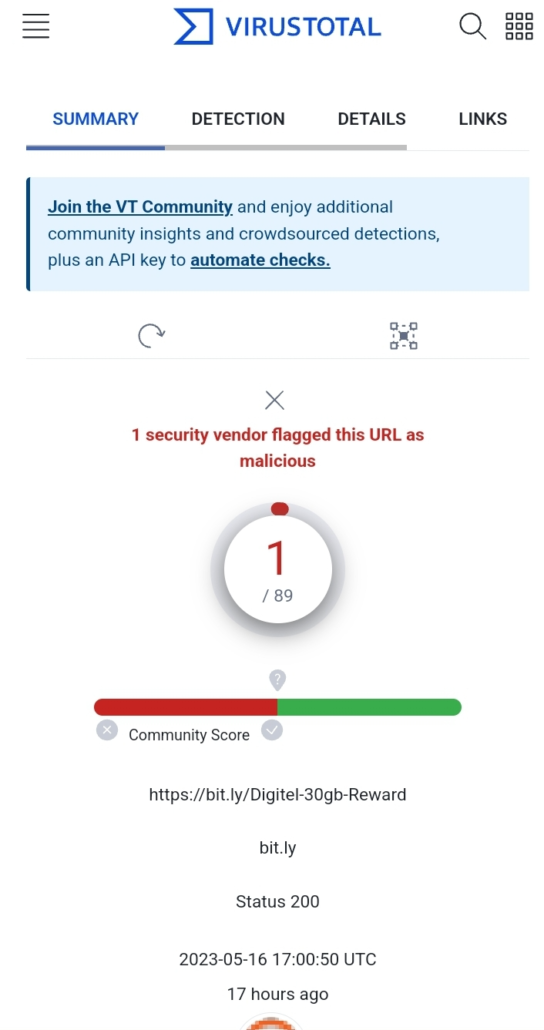
Additionally, a whois search returns different results from both URLs, with the malicious one bit.ly registered in 2008 by Libyan Spider Network (int) in New York.
A Whois search reveals that the malicious URL was registered in 2023, while the genuine Digitel South Sudan website, digitelss.com, was registered in 2020 by Techno Bros from Melbourne.


Conclusion:
The viral WhatsApp message promising a 30GB data reward from Digitel South Sudan is false, and the accompanying hyperlink is malicious.
To ensure accuracy and transparency, we at 211 Check welcome corrections from our readers. If you spot an error in this article, please request a correction using this form. Our team will review your request and make the necessary corrections immediately, if any.
It is crucial to fight against misinformation and disinformation in mainstream and alternative media by avoiding becoming a victim of fake news. To prevent the spread of false information, you must refrain from sharing content you are unsure about or unaware of its origin. Disinformation and misinformation can be incredibly dangerous because they can mislead people and cause harm. For instance, false information on health matters can lead to wrong decisions that can put people’s lives at risk. Therefore, it’s vital to fact-check information before sharing it to promote accurate and reliable information. Visit https://211check.org/ for more information on our fact-checking process, or send us a WhatsApp message at +211 917 298 255 if you want to present a claim. Our team will promptly respond to your request because we believe #FactsMatter.



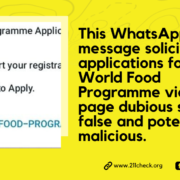
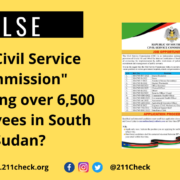
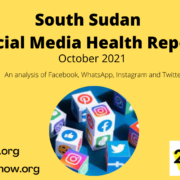 211 Check
211 Check 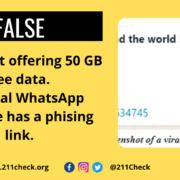

Leave a Reply
Want to join the discussion?Feel free to contribute!